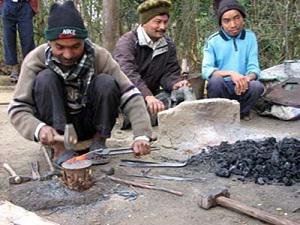Bhim Bahadur Koirala
The main aim of the project is to focus on Blacksmiths’ population devolving to initiate integrated environmental activities which will ensure conservation of environment as well as provide opportunity for income generation to sustain their livelihoods.

Briquettee production machine made by Blacksmith.
Blacksmith, locally known as Kami, is one of the dalit castes, the untouchables, in the Nepalese caste system. People have different occupation to sustain their livelihoods which has direct impact on social, cultural and nearby natural environment. Among different ethnic people, Blacksmiths is one of the communal, disadvantaged and underprivileged ethnic people who are famous for their handicraft works for making iron equipment. Blacksmiths are therefore named after their traditional works and occupation. In the rural areas of Nepal, most of the agricultural equipment such as “Halo”, “Kuto”, “Kodalo” and “Hasiya” etc. are supplied by these blacksmiths and this is the main source of income for their livelihoods.

Blacksmiths are working their own profession for livelihoods.
The project has been designed in favour of indigenous Blacksmiths population in the rural villages of Lamjung district in order to bring the environmental friendly pit kiln method to prepare charcoal in place of open kiln that ultimately helps to conserve forest resources. At the commencing of our program, we have just selected the Bhendikharka site, a prime habitat of Blacksmith community of Chakratirtha VDC-3, Lamjung to make a model Blacksmith village by providing skill, knowledge, goods and services. Indigenous Blacksmiths community has been using a traditional method of making charcoal which is very wasteful method and directly negative impacts on forest resource. So the project will focus on group of Blacksmiths’ population devolving to initiate integrated environmental activities which could ensure conservation of environment as well as provide opportunity for income generation to sustain their livelihoods.
This project activity will definitely help to reduce the pressure on forest resources, create awareness and improve the livelihoods of Blacksmiths. Various awareness raising program on alterative energy resources will be organized through community mobilization. They will gradually adopt and convince to conserve the forest resources by using minimum resources with the appropriate methods of improved kiln (Charcoal making process), Improved Cooking Stove Program (ICSP), awareness raising program and various skill based training for their livelihoods. The followings have been expected as the major outcomes of the project that surely direct or indirect related to nature conservation for the future courses of actions.
A. Blacksmiths beneficiaries will be sensitized and informed energy efficient technologies on charcoal making and introduced energy efficient technologies in their indigenous occupation of making iron equipment;
B. Production capacity of Blacksmiths on iron equipment increased and developed;
C. Conducted Improved Cooking Stoves ( ICS) installation program( focus on training program);
D. Capacity and skills of Blacksmiths population increased and energy efficiency technology promoted;
E. Energy demand mitigating measures promoted and adopted by users;
F. Fruit, fodder, NTFP and medicinal plants planted in beneficiaries households field;
G. Livelihoods opportunities for Blacksmiths households developed;
H. Capacity building and skills development of beneficiaries enhanced and improved service delivery mechanisms;
I. Awareness raising materials ( leaflets, poster, video showing , etc) and community based plantation program.